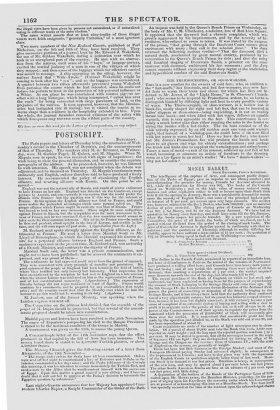POSTSCRIPT.
SATUltDAT.
The Paris papers and letters of Thursday bring the conclusion of Wed-
nesday's debate in the Chamber of Deputies, and the commencement of' that of Thursday. The speakers after M. de Its-smusat, on Wednes- day, were M. Gander Pages, M. Guizot, and M. Maguin. When M. Maguin rose to speak, he was received with signs of impatience; the wish being to close the general discussion, and to consider the separate paragraphs of the address. As he proceeded, however, he was listened to with attention. His speech was not concluded when the debate was adjourned, and he resumed on Thursday. M. Ma,sruin's sentiments were eminently anti 'English, and are therefore said to have produced a lively interest. Ile recommended the policy of abandoning the English alliance, and courting alliance with Russia. On this point he oh- served— England was not the natural ally of' Russia, and would of course endeavour to have France on her side. England was detested on the Continent, except perhaps by Austria, and consequently it was certain that she would prefer the alliance with France: but the question was if this was for the interest of France. In his opinion the English alliance was fittal to France, and could never realize the pretended advantages which sonic persons relied on. The proper alliance which France ought to cultivate was that of Russia. France was bound to look to her own interests, There might be some antipathies against France in Russia, but the sympathies were far more numerous in fa- vour of France, and he was convinced that the two countries would sooner or later unite for their common interests. His advice to France was—be united, be firm and prudent, stand upright in the face of Europe, and confide in for- tune, and she will soon repair all past evils. (Approbation from the Lep.) M. Bechard next spoke strongly against the English alliance, as de- trimental to France. Ile read a letter from Marshal Soult to Mr. Lloyd of Birmingham, in which the Marshal expressed his sincere de- sire for a perpetual alliance between England and France. Such a sentiment expressed at the present tune, M. Bechard said, was unworthy of a French Minister, and contraryto the dignity of France. Marshal Soult said, the letter was a private communication, and ought not to have been published; but he avowed the sentiments it ex- pressed, and was proud of them— The sentiments he had expressed could never form the ground of reproach. They were consistent with every principle of morality and patriotism. His good opinion of the people of England had been formed in the field of battle, where they testified not only bravery but humaility. That impression had been strengthened by the reception he had nag in England on a late mission, when the utmost honour was conferred on him as the representative of France and of her constitutional monarchy. (Approbation.) The expression of friendly feelings did not argue weakness or want of dignity. France would continue her armaments, and he prepared fir any eventualities that might arise; annt tine country would Mel that the :Ministry over which he had the honour to preside would nut he wanting in its duty. (App/arise.) M. Jaubert, one of the former Ministry, was speaking when the London express was sent off.
The Committee on the address had decided that the ensemble of the projait 1. Dupin should be preserved, but that several of the amend- ments proposed should be taken into consideration.


























 Previous page
Previous page